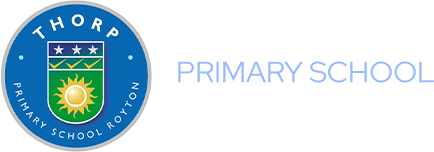Music
Intent
The intention of the music scheme at Thorp Primary School is first and foremost to help children to feel that they are musical, and to develop a life-long love of music. We focus on developing the skills, knowledge and understanding that children need in order to become confident performers, composers and listeners. Our curriculum introduces children to music from all around the world and across generations, teaching children to respect and appreciate the music of all traditions and communities.
Children will develop the musical skills of singing, playing tuned and untuned instruments, improvising and composing music, and listening and responding to music. They will develop an understanding of the history and cultural context of the music that they listen to and learn how music can be written down. Through music, our curriculum helps children develop transferable skills such as team-working, leadership, creative thinking, problem-solving, decision-making, and presentation and performance skills. These skills are vital to children’s development as learners and have a wider application in their general lives outside and beyond school.
Our scheme of work enables pupils to meet the end of key stage attainment targets outlined in the national curriculum and the aims of the scheme align with those in the national curriculum.
Aims
The national curriculum for music aims to ensure that all pupils:
- perform, listen to, review and evaluate music across a range of historical periods, genres, styles and traditions, including the works of the great composers and musicians.
- learn to sing and to use their voices, to create and compose music on their own and with others, have the opportunity to learn a musical instrument, use technology appropriately and have the opportunity to progress to the next level of musical excellence.
- understand and explore how music is created, produced and communicated, including through the interrelated dimensions: pitch, duration, dynamics, tempo, timbre, texture, structure and appropriate musical notations.
Implementation
We have a creative approach throughout school with regards to the delivery of the music curriculum. Charanga Musical School enables children to understand musical concepts through a repetition-based approach to learning. Learning about the same musical concept through different musical activities enables a more secure, deeper learning and mastery of musical skills. An integrated approach to musical learning means that the whole experience is important and children are learning music through a range of activities, including:
- Listening and appraising
- Musical activities
- Performing and sharing
- We meet National Curriculum expectations for music through our use of Charanga Music Scheme.
At Foundation Stage children will sing a range of well-known nursery rhymes and songs, begin to move to music and explore sounds through listening and simple music making.
KS1
- use their voices expressively and creatively by singing songs and speaking chants and rhymes
- play tuned and untuned instruments musically
- listen with concentration and understanding to a range of high-quality live and recorded music
- experiment with, create, select and combine sounds using the inter-related dimensions of music.
KS2
- play and perform in solo and ensemble contexts, using their voices and playing musical instruments with increasing accuracy, fluency, control and expression
- improvise and compose music for a range of purposes using the inter-related dimensions of music
- listen with attention to detail and recall sounds with increasing aural memory
- use and understand staff and other musical notations
- appreciate and understand a wide range of high-quality live and recorded music drawn from different traditions and from great composers and musicians
- develop an understanding of the history of music
Musical learning is built around the ‘Interrelated Dimensions of Music’: pulse, rhythm, pitch, tempo, dynamics, timbre, texture, structure and notation. These dimensions are at the centre of all the learning. Over time, children can both develop new musical skills and concepts, and re-visit established ones. Every child is given the opportunity to learn to play a musical instrument.
We provide the children with the opportunity to perform and share their music skills in class assemblies. Performances seen in celebrational events and concerts held at Harvest, Christmas and Easter, show that music is an important part of school life.
Impact
The musical journey of children in our school and the experiences we offer, will engage and inspire pupils to have a love and appreciation of music. The impact of teaching music will be seen across the school with an increase in the profile of music. It brings together intellect and feeling and enables personal expression, reflection and emotional development. As an integral part of culture, past and present, it helps pupils understand themselves and relate to others, forging important links between the home, school and the wider world.
By encouraging the enjoyment and engagement in music, children will develop the skills, knowledge and understanding that will allow them to fulfil their potential. We endeavour to provide guidance and further opportunities to support them in their next steps.
Music at Home
Curriculum Road Map
Knowledge Organisers
Year 1
Year 2
Year 3
Year 4
Year 5
Year 6

OUR SOCIAL WALL